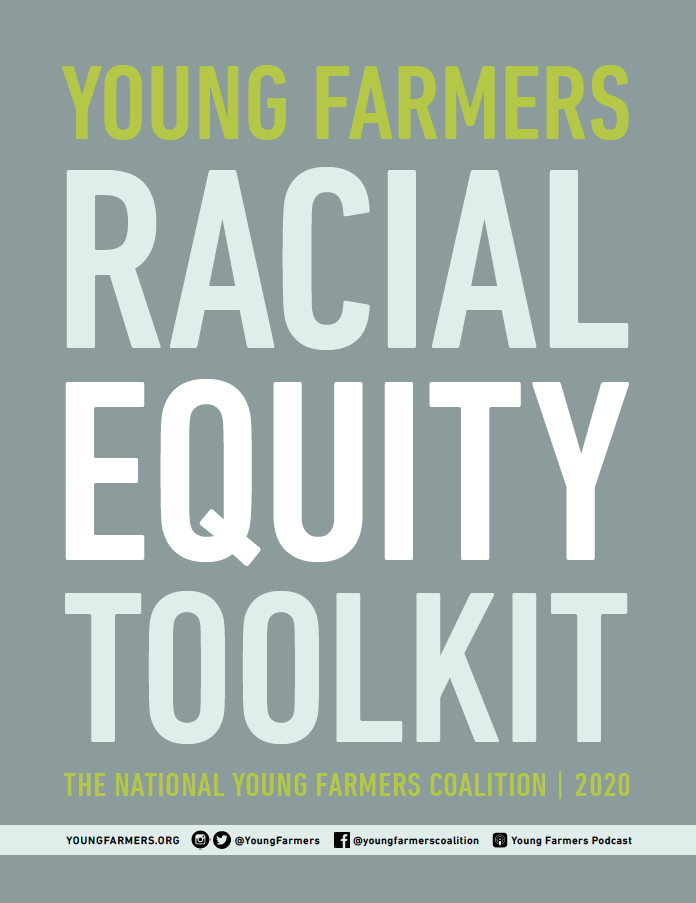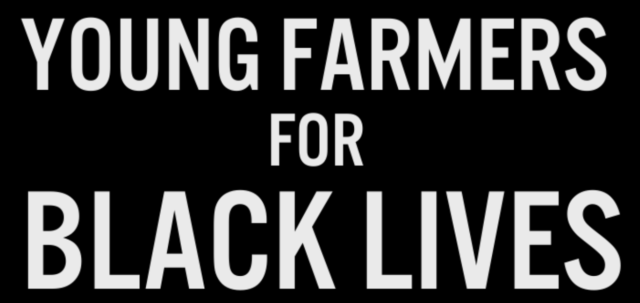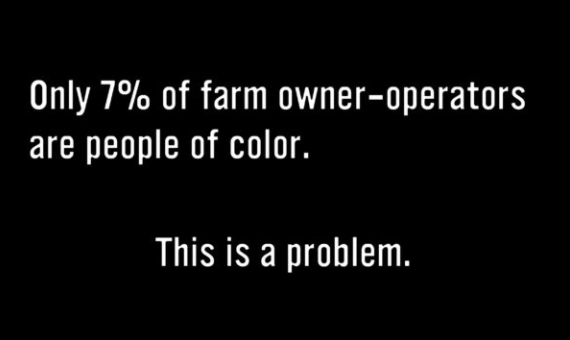Young Farmers for Racial Equity
- Prioritizing BIPOC farmers as co-facilitators for our Food Safety Farmer Focus Groups.
- Providing 100+ free memberships and Young Farmers produce safety resource tipsheets for BIPOC farmers.
- Partnering with BIPOC farmers, service providers, and organizations for urban ag-focused produce safety work in the fall/winter.
- Centering the stories of BIPOC farmers and ranchers and farm workers in social media and national press including the Washington Post, Civil Eats, Modern Farmer, and more.
- Amplifying the resources and fundraisers of BIPOC-led partner organizations and BIPOC farmers on social media channels.
- Prioritizing contracts with BIPOC designers, illustrators, and web developers.
- Creating a language justice process guide and Spanish language translations for all Young Farmers publications.
- Introducing funders to BIPOC and frontline organizations, encouraging them to provide. capacity building support.
- Providing grant writing support to frontlines organizations.
- End of Year campaign acknowledging equity learnings.
- Updating funders on our equity work.
- Convening HR and operations professionals from multiple organizations in order to learn from each other and share best practices on how to align our policies with our commitment to racial equity.
- Revamped our Annual Performance Evaluation process by:
- directly evaluating staff on the degree to which they contributed to advancing racial equity within their program
- adding multi-directional reviews to ensure equitable management practices
- Expanded our Onboarding process to ensure new staff, especially new BIPOC staff, feel supported and welcomed into the organization right from the start.
- Developing new and revised metrics and KPIs to better track our work and to hold ourselves accountable.
- Building leadership development opportunities for young BIPOC farmers and ranchers through trainings, events, and fellowships. Planned a BIPOC farmer designed and BIPOC farmer centered 2020 Leadership Convergence that will include anti-racist trainings and workshops.
- Connected young BIPOC farmers and ranchers to impactful advocacy opportunities with the press and elected officials.
- Published the Racial Equity Toolkit and supported chapters, at-large advocates, and partner organizations through racial equity transformations.
- Provided 50 $5,000 grants to young farmers through the Young Farmer Grant Program–39 of 50 grants went to BIPOC farmers–and provided Spanish language application options.
- Planning anti-racism in the food system training in collaboration with Soil Generations (NE SARE grant) with two Pennsylvania chapters.
- Released a Spanish language version of our Finding Farmland Calculator and Online Course to our network and engaged in direct outreach to farm service organizations that work with Spanish-speaking farmers. The Calculator and Online Course are designed to reduce barriers to land access and financing by providing farmers with impartial, comprehensive, and interactive tools and information to make these processes more transparent.
- Researching and incorporating Native land acknowledgment into our events and sharing resources on land acknowledgment with our membership through the Racial Equity Toolkit.
- Conducting stakeholder interviews with representatives from BIPOC-led organizations, amplifying BIPOC-developed policy platforms, and advocating for policy change to facilitate land access for BIPOC farmers as part of our forthcoming land access policy report.
- Featuring BIPOC farmers in our Land Access Ambassador program. Ambassadors receive a stipend, media training, and Young Farmers membership. These farmers will be featured in our forthcoming land access policy report as well as connected with the press to tell their stories.
- Sharing policy history and land ownership statistics in presentations to illustrate the discrimination and dispossession of land that BIPOC farmers have faced, as well as connect this history to ongoing challenges and necessary policy change.
- Sharing the work of BIPOC-led organizations that are addressing land access through policy, organizing, and creating innovative new tools for land security.
- Coaching land trusts around the country on shifting their work towards creating affordable, secure land access opportunities for BIPOC and young farmers, through models such as working farm easements and the ground lease, and by sharing the work of Northeast Farmers of Color Land Trust, Minnow, and other organizations working on land justice for BIPOC farmers.
- Exploring incorporating language justice into our land access workshops.
- Advocating for equitable access to federal Covid relief and protections for farmers of color and farm workers.
- Prioritizing federal programs that provide training, land access, and secure land tenure for farmers of color in our advocacy for government funding (e.g. the Heirs Property Relending Program and the 2501 Program (Outreach and Assistance for Socially Disadvantaged and Veteran Farmers and Ranchers Program).
- Created an inclusive, equity-driven Federal Policy Setting Process that mandates at least one BIPOC farmer representative for each region and incorporates input from multiple affinity groups, including one for BIPOC farmers.
- Engaged Pennsylvania policy officials in support of the Driving PA Forward campaign for standard drivers licenses regardless of immigration status.
- Supporting PA Dept. of Ag in accountability to their Black Lives Matter statement
- NY chapters digging into Racial Equity Toolkit. Upper Hudson Valley Chapter is hosting bi-weekly discussions of the toolkit readings and planning several actions this fall to support their local Black Lives Matter chapter including sign-making and a Tractorcade.
- Greater Catskills chapter is hosting a Roundtable discussion with New York Senator Jennifer Metzger’s office and other legislative leaders on the topic of promoting equity in the food system.
- Supporting NY chapters in development of a statewide policy setting process designed to advance racial equity.
- Member of Project Protect Food System, a Colorado food system worker response team to ensure always-essential workers are adequately protected from COVID and appropriately compensated for their labor and for the risks they assume in service to the common good.
- One theme of the Colorado Young Farmers Water Fellows program is diversity, equity, and inclusion, along with water literacy and leadership development.
- Working with Colorado Water Conservation Board to create equitable outreach plan to include stakeholders in the Colorado Water Plan update.
- Advocating for the inclusion of equity statements throughout RMFU NM Policy Book
- Feature (and compensate) BIPOC farmers for the Rio Grande Farmers Coalition Healthy Soils Project.
- Partnerships with BIPOC-led orgs and farmers in the region.
- NM Chapters holding racial equity-focused meetings.
- Launching our California Young Farmer Political Leadership Fellowship, a program designed to support four young BIPOC farmers in achieving leadership positions in agriculture.
- Serving as a member of a CA working group to create a Healthy Soils Platform (principles and policy solutions) that centers farmers of color and impacted communities of color.
- With our founding California Director, Mai Nguyen, moving on to focus on their land project Minnow, we are hiring for a California Campaigns Director and California Organizer who will organize young farmers, particularly BIPOC farmers, across the state to advocate for equitable agricultural policy.
Young Farmers Equity Resources

Young Farmers Racial Equity Toolkit (2020)
This toolkit is a starting point. It aims to orient and incite members toward preliminary consciousness-raising and direct action. This toolkit does not detail a universally applicable pathway toward resolving pervasive racialized oppression; it is an initial resource for people who are overwhelmed by the breadth and depth of the problem, and need help determining how to start dismantling racism in their communities.

Young Farmers for Black Lives Statement (2020)
It is unacceptable that these lives, and so many others, have been taken from our communities. It is unacceptable that the murder of Black people goes unpunished, and that elected officials condone these deaths with their inaction. We stand in solidarity with protests across the country and with the individuals who demand justice and accountability from law enforcement. We stand against the reactionary forces of white supremacy that deem these demands unreasonable and those who consider “Black lives matter” a debatable assertion.

Ending Violence Against People of Color in Food and Farming (2016)
We at the National Young Farmers Coalition are stricken by the persistent violence against black people, including the recent killings of Alton Sterling, Philando Castile, Delrawn Small and Paul O’Neal, among too many others. Like many of you, we’ve processed shock, anger, fear, grief—and felt called to respond to a deeper questioning: What is our role as a young farmer advocacy organization with predominantly white leadership in showing up for racial justice? What does this time ask of us?